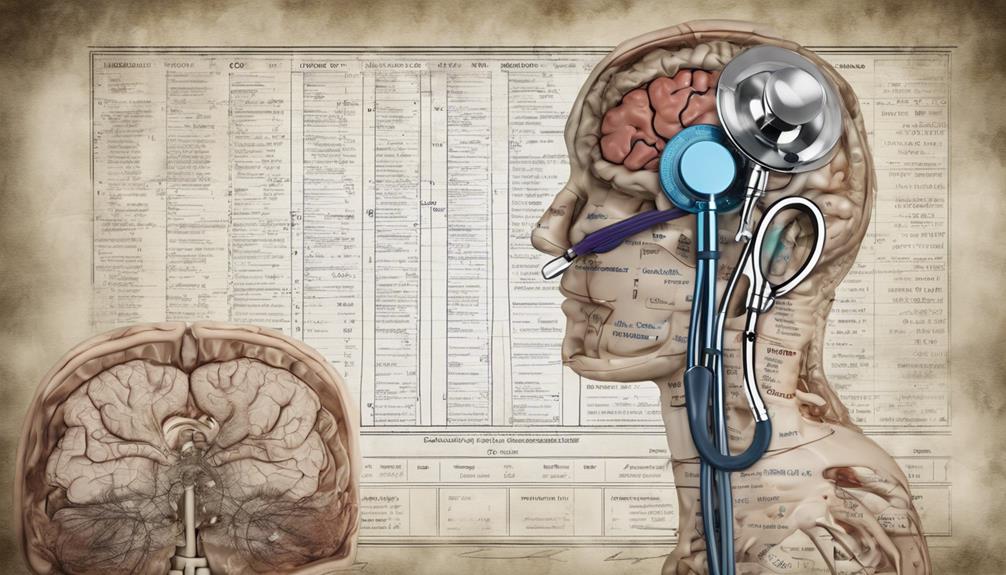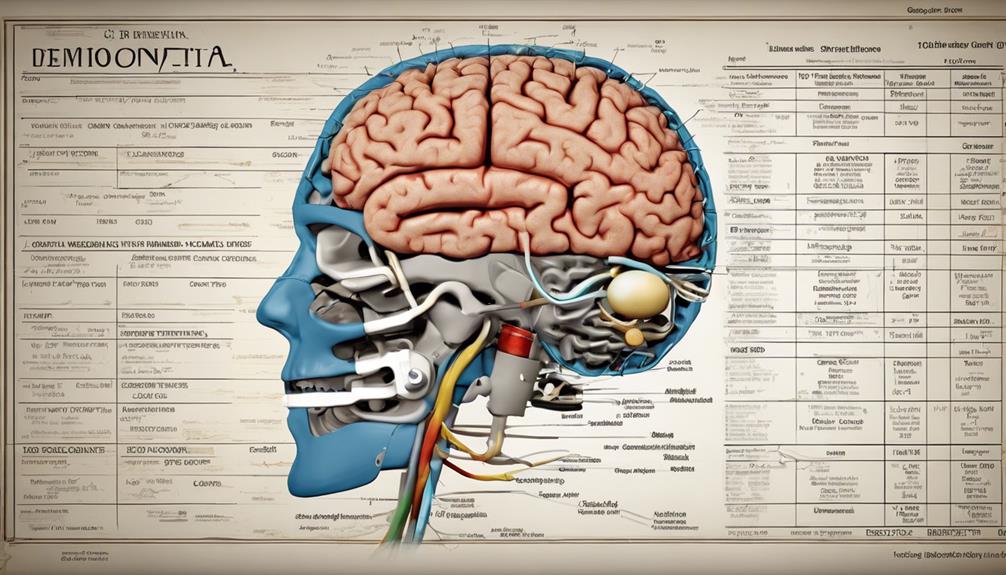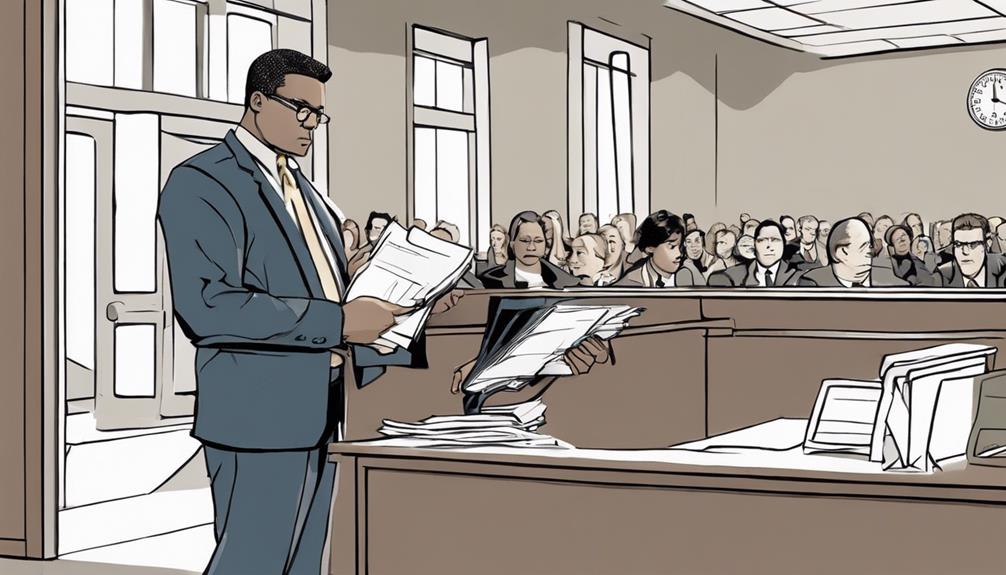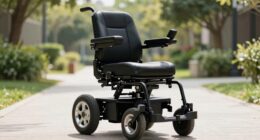The challenges of dealing with dementia include the complexity of finding the correct ICD-10 code for cases involving behavioral disturbances, which is a significant hurdle.
The ability to accurately pinpoint the specific code for dementia with behavioral disturbance not only aids in proper documentation but also plays a pivotal role in streamlining treatment and care plans.
As we unravel the nuances of this diagnostic coding process, we will shed light on the intricacies that healthcare professionals encounter in ensuring precise classification and targeted interventions for individuals grappling with this multifaceted condition.
Key Takeaways
- Identification of triggers crucial for effective management.
- Accurate diagnosis essential for tailored treatment plans.
- ICD-10 code F02.81 aids in tracking behavioral issues.
- Detailed documentation supports comprehensive care planning.
Understanding Dementia With Behavioral Disturbance
In understanding dementia with behavioral disturbance, identifying the triggers for these behaviors is crucial for effective management. Aggressive behavior, such as verbal outbursts or physical aggression, and wandering off are common manifestations of behavioral disturbance in dementia. These behaviors not only affect the individuals with dementia but also impact the quality of life of their caregivers.
To address these challenges, various management strategies are employed, including medication, therapy, and environmental modifications. However, to truly make a difference, it's essential to delve deeper into the root cause of these behavioral disturbances.
Advancements in dementia care have highlighted the importance of focusing on addressing behavioral symptoms to enhance the overall quality of life for both patients and caregivers. By understanding the triggers and underlying reasons for aggressive behavior and wandering in dementia, we can tailor more effective and personalized management approaches, ultimately improving the well-being of those affected by this condition.
Importance of Accurate Diagnosis

Accurate diagnosis of dementia with behavioral disturbance plays a pivotal role in tailoring effective treatment plans and improving patient outcomes. Proper diagnosis is essential for identifying the specific behavioral disturbances present in patients with dementia, allowing healthcare providers to tailor interventions and management strategies accordingly.
Early recognition of behavioral issues not only enhances the quality of life for patients but also provides support for caregivers. Detailed assessment of behavioral symptoms aids in selecting appropriate therapies and support services, leading to better outcomes for individuals affected by dementia.
Additionally, accurate coding of dementia with behavioral disturbance ensures proper documentation for reimbursement purposes and facilitates the tracking of patient progress over time. By prioritizing precise diagnosis and comprehensive evaluation of behavioral symptoms, healthcare professionals can optimize treatment planning and management strategies to provide the best possible care and support for patients with dementia.
Coding Guidelines for ICD-10
Understanding the coding guidelines for ICD-10 is crucial for accurately documenting dementia with behavioral disturbance and ensuring proper identification of specific behavioral issues in patients. When it comes to accurate coding for dementia with behavioral disturbance using ICD-10-CM, there are several key points to keep in mind:
- The ICD-10-CM code F03.B1 is specifically designated for Unspecified Dementia, Moderate, with Behavioral Disturbance.
- This code is located within the Mental, Behavioral, and Neurodevelopmental Disorders chapter in the ICD-10-CM, providing chapter-specific guidelines for coding dementia with behavioral disturbances.
- It includes Excludes1 and Excludes2 notes to guide accurate and precise coding practices.
- Within the code, there are subsections addressing different types of behavioral disturbances commonly observed in patients with dementia.
Commonly Used ICD-10 Code

How does the commonly used ICD-10 code F02.81 help healthcare providers classify dementia with behavioral disturbance accurately? The ICD-10 code F02.81 plays a crucial role in accurately categorizing patients with dementia and behavioral disturbances, aiding in appropriate medical coding and documentation. Here is a breakdown of how this code assists healthcare providers:
| Category | Code | Description |
|---|---|---|
| ICD-10 Code | F02.81 | Dementia with behavioral disturbance |
| Medical Coding | F02.81 | Ensures precise classification for billing purposes |
| Mental Disorders | F02.81 | Identifies specific behavioral aspects of dementia |
| Treatment Plans | F02.81 | Guides tailored interventions for behavioral symptoms |
| Accurate Classification | F02.81 | Helps in tracking and addressing behavioral issues |
Documentation Tips for Healthcare Providers
When documenting patients with dementia and behavioral disturbances, it's essential to provide detailed descriptions of the specific behavioral issues observed. It helps in understanding the patient's condition better and tailoring interventions accordingly.
Here are some documentation tips for healthcare providers:
- Include detailed descriptions of the specific behavioral disturbances observed in the patient with dementia.
- Document any triggers or patterns that exacerbate the behavioral disturbances in the patient.
- Note the frequency and severity of the behavioral disturbances to track changes over time.
- Record any interventions or strategies implemented to manage the behavioral disturbances effectively.
Collaborating with the interdisciplinary team is crucial to ensure comprehensive documentation of the patient's behavioral challenges and responses to treatment. By working together, healthcare providers can develop a holistic approach to address the behavioral disturbances associated with dementia effectively.
Frequently Asked Questions
What Is Dementia With Behavioral Disturbance?
Dementia with behavioral disturbance encompasses cognitive decline paired with disruptive behaviors like aggression or agitation. These behaviors impact both patients and caregivers, necessitating a multidisciplinary approach for management.
Understanding the root cause is crucial for effective care. Research focuses on improving patient outcomes by addressing behavioral symptoms. Effective management involves a combination of medication, therapy, and environmental adjustments.
What Is the ICD-10 Code for Behavioral Disturbances?
Sure thing! Understanding the ICD-10 code for behavioral disturbances is vital in healthcare. Accurate coding ensures proper diagnosis and treatment planning for patients. It's crucial for improving their quality of life.
We must pay attention to behaviors like aggression and wandering off. Behavioral disturbances impact both patients and caregivers. Proper coding, like 294.1 for behavioral disturbances in dementia, helps us address these challenges effectively.
What Is the ICD Code for Dementia Without Behavioral Disturbance Unspecified Dementia Type?
When documenting dementia without behavioral disturbance, the ICD-10 code used is F03.90.
This code specifically covers unspecified dementia without behavioral disturbances and falls under Mental, Behavioral, and Neurodevelopmental Disorders in the ICD-10 system.
Accurate coding with F03.90 is crucial for tracking and managing cases of dementia that don't involve behavioral disturbances.
What Is the Second Most Common Behavior Manifestation Associated With Dementia?
The second most common behavior manifestation associated with dementia is agitation. It manifests as restlessness, pacing, verbal aggression, or physical aggression towards others.
Agitation in dementia can stem from confusion, frustration, environmental factors, or unmet needs. Understanding triggers, creating a calm environment, and using non-pharmacological interventions are key to managing agitation before considering medications.
Addressing agitation is vital for enhancing the quality of life for individuals with dementia and their caregivers.
Conclusion
As healthcare providers, navigating the complexities of dementia with behavioral disturbance can feel like trying to find a path through a dense forest.
However, with the precise guidance of the ICD-10-CM Code F03.B1, we're equipped with a compass to lead us towards accurate diagnosis and effective treatment.
Let's continue to shine a light on these challenging cases, ensuring our patients receive the care and support they truly deserve.









